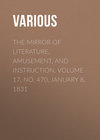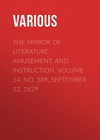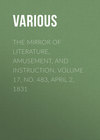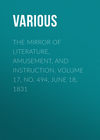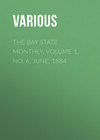Czytaj książkę: «The Mirror of Literature, Amusement, and Instruction. Volume 17, No. 470, January 8, 1831», strona 3
A CHRISTMAS CAROL.—IN HONOUR OF MAGA. (BLACKWOOD.)
SUNG BY THE CONTRIBUTORS
Noo—hearken till me—and I'll beat Matthews or Yates a' to sticks wi' my impersonations.
TICKLER
When Kit North is dead,
What will Maga do, sir?
She must go to bed,
And like him die too, sir!
Fal de ral, de ral,
Iram coram dago;
Fal de ral, de ral,
Here's success to Maga.
SHEPHERD
When death has them flat,
I'll stitch on my weepers,
Put crape around my bat,
And a napkin to my peepers!
Fal de ral, de ral, &c.
NORTH
Your words go to my heart,
I hear the death-owl flying,
I feel death's fatal dart—
By jingo, I am dying!
Fal de ral, de ral, &c.
COLONEL O'SHAUGHNESSY.
See him, how he lies
Flat as any flounder!
Blow me! smoke his eyes—
Death ne'er closed eyes sounder!
Fal de ral, de ral, &c.
DELTA
Yet he can't be dead,
For he is immortal,
And to receive his head
Earth would not ope its portal!
Fal de ral, de ral, &c.
O'DOHERTY
Kit will never die;
That I take for sartain!
Death "is all my eye"—
An't it, Betty Martin?
Fal de ral, de ral, &c.
MODERN PYTHAGOREAN.
Suppose we feel his arm—
Zounds' I never felt a
Human pulse more firm:
What's your opinion, Delta?
Fal de ral, de ral, &c
CHARLES LAMB
Kit, I hope you're well,
Up, and join our ditty;
To lose such a fine old fel-
Low would be a pity!
Fal de ral, de ral, &c.
NORTH
Let's resume our booze,
And tipple while we're able;
I've had a bit of a snooze,
And feel quite comfortable!
Fal de ral, de ral, &c.
MULLION
Be he who he may,
Sultan, Czar, or Aga,
Let him soak his clay
To the health of Kit and Maga!
Fal de ral, de ral, &c.
OPIUM-EATER
Search all the world around,
From Greenland to Malaga,
And nowhere will be found
A magazine like Maga!
Fal de ral, de ral,
Iram coram dago;
Fal de ral, de ral,
Here's success to Maga!
Blackwood—Noctes
Notes of a Reader
KNOWLEDGE FOR THE PEOPLE; OR, THE PLAIN WHY AND BECAUSE
PART III.—Origins and Antiquities
This contains the Why and Because of the Curiosities of the Calendar; the Customs and Ceremonies of Special Days; and a few of the Origins and Antiquities of Social Life. We quote a page of articles, perhaps, the longest in the Number:—
Cock-fighting
Why was throwing at cocks formerly customary on Shrove Tuesday?
Because the crowing of a cock once prevented our Saxon ancestors from massacreing their conquerors, another part of our ancestors, the Danes, on the morning of a Shrove Tuesday, while asleep in their beds.
This is the account generally received, although two lines in an epigram "On a Cock at Rochester," by the witty Sir Charles Sedley, imply that the cock suffered this annual barbarity by way of punishment for St. Peter's crime, in denying his Lord and Master—
"Mayst thou be punish'd for St. Peter's crime,
And on Shove Tuesday perish in thy prime."
A writer in the Gentleman's Magazine also says—"The barbarous practice of throwing at a cock tied to a stake on Shrovetide, I think I have read, has an allusion to the indignities offered by the Jews to the Saviour of the World before his crucifixion."—Ellis's Notes to Brand.
Why was cock-fighting a popular sport in Greece?
Because of its origin from the Athenians, on the following occasion: When Themistocles was marching his army against the Persians, he, by the way, espying two cocks fighting, caused his army to halt, and addressed them as follows—"Behold! these do not fight for their household gods, for the monuments of their ancestors, nor for glory, nor for liberty, nor for the safety of their children, but only because the one will not give way to the other."—This so encouraged the Grecians, that they fought strenuously, and obtained the victory over the Persians; upon which, cock-fighting was, by a particular law, ordered to be annually celebrated by the Athenians.
Cæsar mentions the English cocks in his Commentaries; but the earliest notice of cock-fighting in England, is by Fitzstephen the monk, who died in 1191.
St. George
Why is St. George the patron saint of England?
Because, when Robert, Duke of Normandy, the son of William the Conqueror, was fighting against the Turks, and laying siege to the famous city of Antioch, which was expected to be relieved by the Saracens, St. George appeared with an innumerable army, coming down from the hills, all clad in white, with a red cross on his banner, to reinforce the Christians. This so terrified the infidels that they fled, and left the Christians in possession of the town.—Butler.
Why is St. George usually painted on horseback, and tilting at a dragon under his feet?
Because the representation is emblematical of his faith and fortitude, by which he conquered the devil, called the dragon in the Apocalypse.—Butler.
Why was the Order of the Garter instituted?
Because of the victory obtained over the French at the battle of Cressy, when Edward ordered his garter to be displayed as a signal of battle; to commemorate which, he made a garter the principal ornament of an order, and a symbol of the indissoluble union of the knights. The order is under the patronage or protection of St. George, whence he figures in its insignia. Such is the account of Camden, Fern, and others. The common story of the order being instituted in honour of a garter of the Countess of Salisbury, which she dropped in dancing, and which was picked up by King Edward, has been denounced as fabulous by our best antiquaries.
Cock-crow
Why was it formerly supposed that cocks crowed all Christmas-eve?
Because the weather is then usually cloudy and dark (whence "the dark days before Christmas,") and cocks, during such weather, often crow nearly all day and all night. Shakspeare alludes to this superstition in Hamlet—
Some say that even 'gainst that hallow'd season,
At which our Saviour's birth is celebrated,
The Bird of Dawning croweth all night long.
The nights are wholesome, and no mildew falls;
No planet strikes, nor spirits walk abroad:
No fairy takes, nor witch hath power to charm,
So gracious and so hallowed is the time.
The ancient Christians divided the night into four watches, called the evening, midnight, and two morning cock-crowings. Their connexion with the belief in walking spirits will be remembered—
The cock crows, and the morn prows on,
When 'tis decreed I must be gone."—Butler.
—The tale
Of horrid apparition, tall and ghastly,
That walks at dead of night, or takes his stand
O'er some new-open'd grave; and, strange to tell,
Evanishes at crowing of the cock—Blair.
Who can ever forget the night-watches proclaimed by the cock in that scene in Comus, where the two brothers, in search of their sister, are benighted in a forest?—
—Might we but hear
The folded flocks, penned in their wattled cotes,
Or sound of pastoral reed with oaten stops,
Or whistle from the lodge, or village cock
Count the night-watches to his feathery dames,
'Twould be some solace yet, some little cheering,
In this close dungeon of innumerous boughs.
Dr. Forster observes—"There is this remarkable circumstance about the crowing of cocks—they seem to keep night-watches, or to have general crowing-matches, at certain periods—as, soon after twelve, at two, and again at day-break. These are the Alectrephones mentioned by St. John. To us, these cock-crowings do not appear quite so regular in their times of occurrence, though they actually observe certain periods, when not interrupted by the changes of the weather, which generally produce a great deal of crowing. Indeed, the song of all birds is much influenced by the state of the air." Dr. F. also mentions, "that cocks began to crow during the darkness of the eclipse of the sun, Sept. 4, 1820; and it seems that crepusculum (or twilight) is the sort of light in which they crow most."
Goes of Liquor
Why did tavern-keepers originally call portions of liquor "goes?"
Because of the following incident, which, though unimportant in itself, convinces us how much custom is influenced by the most trifling occurrences:—The tavern called the Queen's Head, in Duke's-court, Bow-street, was once kept by a facetious individual of the name of Jupp. Two celebrated characters, Annesley Spay and Bob Todrington, a sporting man, meeting one evening at the above place, went to the bar, and each asked for half a quartern of spirits, with a little cold water. In the course of time, they drank four-and-twenty, when Spay said to the other, "Now we'll go."—"O no," replied he, "we'll have another, and then go."—This did not satisfy the gay fellows, and they continued drinking on till three in the morning, when both agreed to GO; so that under the idea of going, they made a long stay. Such was the origin of drinking, or calling for, goes.
Why was the celebrated cabinet council of Charles II. called the Cabal?
Because the initials of the names of the five councillors formed that word, thus—
Clifford,
Arlington,
Buckingham
Ashley,
Lauderdale.
